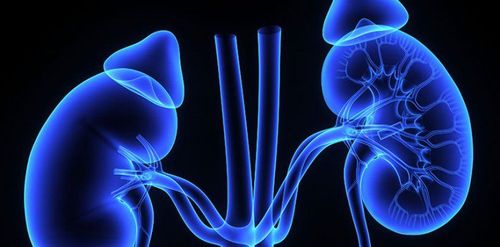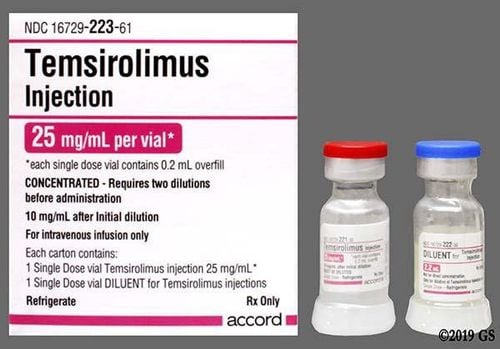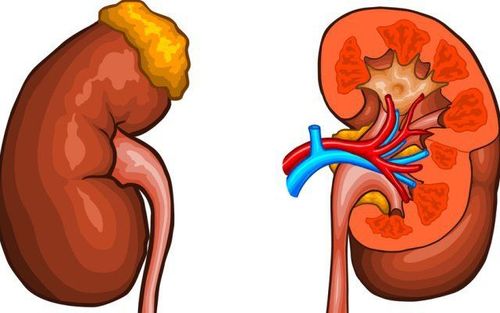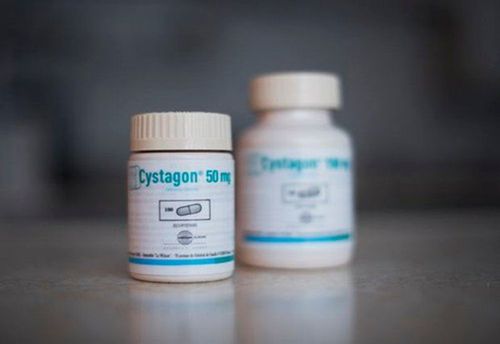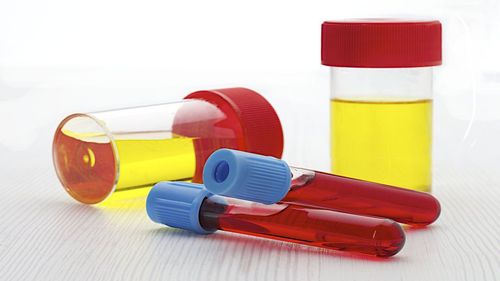This is an automatically translated article.
Adrenal cancer is a rare type of cancer that occurs in one or both adrenal glands. Adrenal cancer, which can occur at any age, is more common in children under the age of 5 and adults between the ages of 40 and 50.1. What is adrenal cancer?
The adrenal glands are responsible for the production of hormones found in almost every organ and tissue in the body. Each adrenal gland has two parts, a cortex and a medulla.The medulla of the adrenal gland produces hormones such as norepinephrine and epinephrine (also called adrenaline). Tumors and cancers that start in the adrenal medulla include: Pheochromocytoma and neuroblastoma.
Cancer that usually develops in the adrenal cortex is called adrenocortical carcinoma or adrenal cancer. Adrenal cancer is usually detected when:
The patient happens to have a routine check-up or a health check-up for other reasons. Due to the production of hormones by the adrenal glands, cancer here will causes body changes such as weight gain and fluid retention, early puberty in children or hair growth, hair growth in women The tumor begins to cause symptoms because the rapid growth presses on other organs in the abdomen, causing pain or a feeling of fullness. Usually, an adrenal cancer is much larger than an adrenal tumor. An adrenal tumor larger than 5 or 6 cm will be considered for evaluation for cancer. In a recent study, the average tumor size of adrenal cancer was about 13 cm. Most adrenal cancers do not begin in the adrenal gland, but are caused by cancers in other organs that spread through the bloodstream to the adrenal glands. Typically lung cancer, melanoma, and breast cancer often spread to the adrenal glands. When other cancers spread to the adrenal gland, it is not called adrenal cancer, but is named and treated based on where the cancer started.
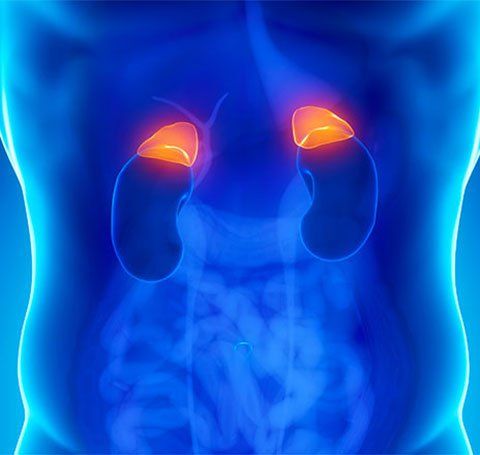
Ung thư tuyến thượng thận là một loại ung thư hiếm gặp
2. Causes of Adrenal Cancer
Cancer can be caused by DNA mutations that “turn on” oncogenes or “turn off” tumor suppressor genes. Some people get cancer because they inherit DNA mutations from their parents that increase the risk of the disease or are sensitive to agents that cause DNA to mutate. But most of the DNA mutations seen in cancer occur during life rather than being inherited. Some mutations can result from exposure to agents such as radiation or cancer-causing chemicals.
Certain DNA mutations cause adrenal tumors in people with inherited syndromes, which are mentioned in the risk factors for adrenal cancer. In general, these factors rarely cause adrenocortical cancer. However, because adrenal cancer is rare, if you have adrenal cancer, your doctor may have to consider genetic tests to find out if you have one of these genetic syndromes. . If you have it, you and your family members may be at risk of developing other cancers.
Li-Fraumeni syndrome caused by inherited mutations that inactivate the tumor suppressor gene TP53. This syndrome accounts for a small fraction of the causes of adrenal cancer in adults (about 1 in 20), but it is often the cause of adrenal cancer in children. In fact, about 8 out of 10 cases of adrenal cancer in children are caused by Li-Fraumeni syndrome.
3. Symptoms of Adrenal Cancer
If the adrenal tumor grows so large that it presses on other organs, the person may feel pain in the abdomen or back. Or you may feel heavy or full soon after eating. If the tumor is large enough, the patient may even notice a lump in the abdomen, but if the tumor is small, the patient may not feel it.
Signs of adrenal cancer when the tumor has affected changes in the levels of certain hormones in the body that will cause a variety of symptoms such as, high androgen levels causing men to have too much facial or upper hair body, penis enlargement in boys or clitoris in girls.
In girls, if there is too much estrogen, there will be early menstrual symptoms or early breast growth and in boys, abnormal breast development may also occur.

Khi phát hiện các triệu chứng ung thư tuyến thượng thận, người bệnh nên đến bệnh viện uy tín để được thăm khám
Men with too much estrogen have symptoms such as enlarged breasts, impotence or loss of sex drive. For women, too much androgen leads to thick hair or hair loss, irregular periods, or a deeper voice.
If the tumor produces too much of the hormone cortisol, the person may gain a few extra pounds or have a puffy face. Both men and women may notice they have weaker bones and muscles and bruise easily. In addition, the person may also have changes in mood or depression, high blood pressure or high blood sugar.
Currently, at Vinmec International General Hospital, cancer screening packages are applied to detect the disease at an early stage, shorten the treatment time, reduce the economic burden and maximize the recovery ability for customers. row.
Customers can directly go to Vinmec Health System nationwide to visit or book an appointment online HERE for support.
References: Mayoclinic.org, Cancer.org, Webmd.com
MORE:
Kidney cancer: What you need to know Advances in the treatment of kidney cancer Laparoscopic surgery with Robot-assisted cancer treatment kidney letter




